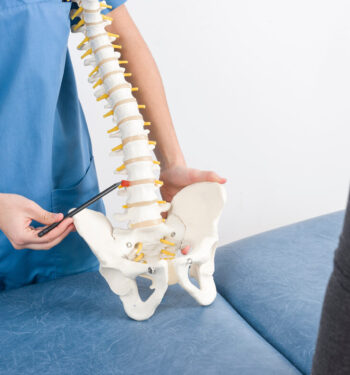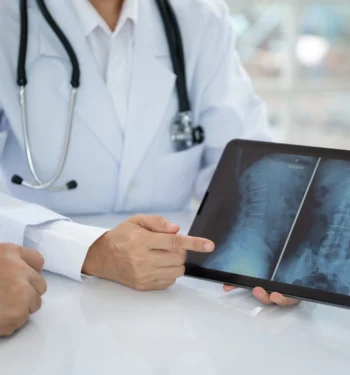
Living with a herniated lumbar disc can be overwhelming, especially when pain radiates down your leg and disrupts daily life. Patients often wonder whether surgery is necessary, if conservative treatments will help, or how to find the right spine specialist in Indiana. Goodman Campbell, a global leader in brain and spine care and the epicenter of both clinical research and neurosurgery training, offers compassionate guidance, advanced treatment options, and direct access to one of the world’s most accomplished neurosurgery teams.
What Is a Herniated Lumbar Disc and How Does It Cause Pain?
A herniated disc occurs when the soft inner material of a lumbar spine disc pushes through its tougher exterior. When the affected disc presses on a spinal nerve inside the spinal canal, it can trigger inflammation, nerve compression, and severe discomfort.
What Are the Symptoms of a Herniated Lumbar Disc?
Common symptoms of a herniated lumbar disc include lower back pain, radiating leg pain (sciatica), numbness, tingling, and muscle weakness. In some cases, herniated disc pain may also cause difficulty walking, problems with coordination, or even bladder or bowel changes — symptoms that demand urgent evaluation.
Can a Herniated Disc Cause Vomiting?
While herniated lumbar disc treatment typically focuses on nerve compression and back pain, severe pain or nerve irritation may occasionally lead to secondary symptoms such as nausea. Persistent vomiting requires immediate medical attention to rule out other causes.
What Is the Most Common Treatment for a Lumbar Herniated Disc?
For most patients, conservative herniated disc treatment is the first step. Nonsurgical treatments focus on relieving pressure from the affected nerve, reducing inflammation, and restoring mobility.
What Is the Fastest Way To Heal a Herniated Disc?
While there is no instant fix, structured physical therapy, interventional pain management, and targeted pain medication are often the fastest routes to achieving disc herniation pain relief. These treatments help reduce swelling, strengthen supportive muscles, and improve function.
What Aggravates a Herniated Lumbar Disc?
Heavy lifting, prolonged sitting, poor posture, and repetitive bending can aggravate the affected area. Patients are encouraged to follow medical advice carefully and avoid activities that worsen back pain or radiating pain.
What Are the Most Effective Conservative Treatments for Herniated Lumbar Discs?
Conservative treatments are usually the first step for herniated disc pain, aiming to relieve pressure on the nerve and restore mobility without surgery. Physical therapy, pain medication, and interventional pain management can ease symptoms and support healing, but it’s important to know when to seek further care if uncommon or concerning signs appear.
When Should You Try Physical Therapy and Interventional Pain Management?
Physical therapists guide patients through tailored exercises that strengthen the lumbar spine and relieve symptoms. Interventional pain management physicians may provide targeted injections that reduce inflammation around the affected nerve, offering significant pain relief and improved function. Both can be part of a treatment plan of conservative measures before surgery is considered.
What Are the Best Surgical Treatment Options for Herniated Lumbar Discs?
When conservative treatments no longer provide relief, surgical intervention may be necessary. Goodman Campbell offers advanced and minimally invasive options, including lumbar discectomy, spinal fusion, and microdiscectomy, performed with precision by highly trained neurosurgeons.
When Is Microdiscectomy the Right Choice for Your Herniated Disc?
A microdiscectomy is often recommended when conservative treatments fail, and nerve compression causes persistent pain, numbness, or weakness. This minimally invasive spine surgery removes only the portion of the herniated disc pressing on the nerve, preserving as much healthy tissue as possible and supporting faster herniated disc recovery.
What Are the Benefits of Minimally Invasive Spine Surgery?
Compared to traditional spine surgery, minimally invasive procedures offer smaller incisions, less disruption to the spinal cord and surrounding muscles, reduced pain, and quicker recovery times. Goodman Campbell’s extensive patient outcomes and efficacy data demonstrate exceptional success rates in restoring quality of life.
How Do You Know When Your Herniated Disc Requires Professional Treatment?
For people in the Midwest, if conservative treatments fail to relieve symptoms, if leg pain worsens, or if signs of nerve damage appear, professional care from a spine specialist in Indiana is essential. The sooner an accurate diagnosis is made, the quicker a personalized treatment plan can begin.
How Do You Choose the Best Spine Specialist for Herniated Disc Treatment in Indiana?
Selecting the right care team is vital for long-term results. Goodman Campbell provides spine care in Indiana that patients across the Midwest trust for both simple and complex spine conditions.
Why Should You Consider a Neurosurgeon Over an Orthopedic Surgeon?
Neurosurgery education and training are more extensive in addressing the spinal cord and nerves than orthopedic surgery is. Goodman Campbell’s neurosurgeons combine this specialized expertise with advanced skills in both conservative treatments and surgical intervention, ensuring comprehensive care for degenerative disc disease, chronic back pain, and herniated lumbar disc cases.
What Questions Should You Ask When Selecting Your Spine Care Team?
Patients should ask about:
- The team’s experience with lumbar disc herniation surgery.
- Availability of minimally invasive and nonsurgical disc treatment options.
- Patient success outcomes data for procedures such as lumbar discectomy, spinal fusion, and spinal decompression.
- Accessibility and speed of scheduling appointments.
At Goodman Campbell, patients receive transparent answers, reassurance, and direct access to one of the world’s most progressive neurosurgery teams. With proven outcomes, compassionate care, and advanced treatment options, their reputation draws individuals from across Indiana and beyond. For those seeking herniated disc treatment in Indiana, Goodman Campbell’s spine specialists can provide a healing path forward to less pain, more comfort, and a better quality of life.


